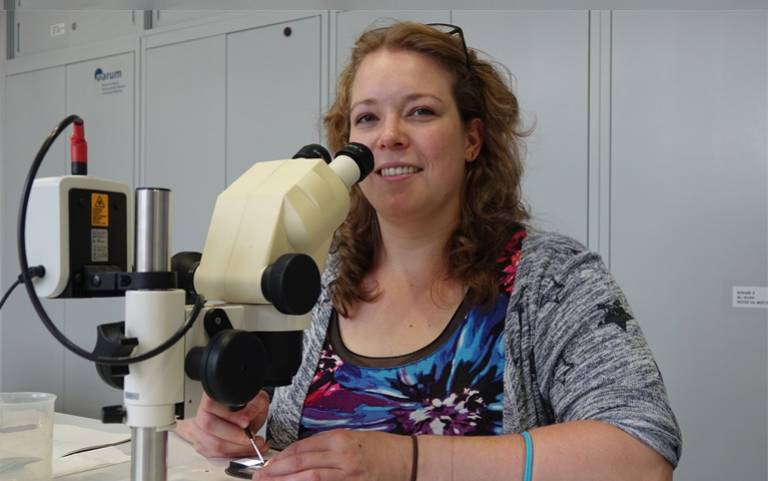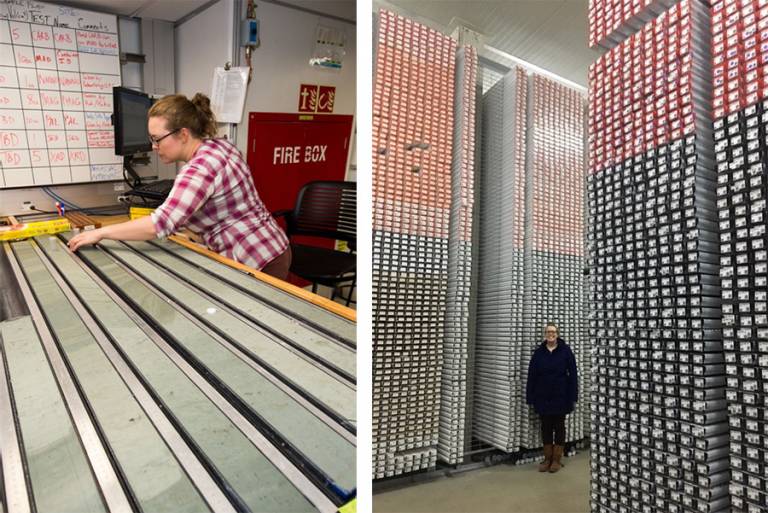EGU 2020 Division Outstanding Early Career Scientist Award
20 April 2021
Dr Anna Joy Drury received the 2020 Division Outstanding Early Career Scientist Award in Stratigraphy, Sedimentology and Palaeontology for her fundamental contributions to research on Miocene stable isotope stratigraphy, palaeoceanography and climate evolution.

Anna Joy Drury picking benthic foraminifera for stable isotope analyses. Credit Alexa von Busse, Bremen, 2018
The 2020 Division Outstanding Early Career Scientist Award for Stratigraphy, Sedimentology and Palaeontology was awarded to Anna Joy Drury for her fundamental contributions to research on Miocene stable isotope stratigraphy, palaeoceanography and climate evolution, as well as for her engaging and motivating attitude towards the scientific community, especially through her encouragement of fellow young(er) researchers.
“My research interests combine palaeoceanography, stratigraphy and geochemistry to reconstruct Cenozoic climate evolution and dynamics with the aim of constraining natural climate variability to provide context for future environmental change. I am especially interested in understanding the late Miocene (11.63-5.33 Ma), as this is when we see the emergence of conditions on Earth that are similar to those seen today.Material recovered by IODP underpins Anna Joy’s research. She sailed as a shipboard Physical Properties Expert on IODP Expedition 363 to the Western Pacific Warm Pool (left; Credit: Bill Crawford, IODP) and has regularly received samples from the three IODP core repositories in Bremen (right), College Station and Kochi.
In her research, Anna Joy combines classic stable isotope measurements on benthic foraminifera with expertise in stratigraphy and astrochronology. Much of her research utilises deep-sea sediments recovered by the International Ocean Discovery Program (IODP) and its predecessors. She co-developed the Code for Ocean Drilling Data (CODD) and uses this software to push the boundaries of stratigraphy by synthesising and analysing diverse datasets using a reproducible and quantitively methodology. This integrated approach combining stratigraphy, geochemistry and data science has allowed her to solve several outstanding stratigraphic conundrums that until recently hampered the understanding of late Miocene climate evolution.
The award was originally to be presented during EGU 2020, but due to COVID-19, this was postponed until vEGU21: Gather Online, which is taking place virtually between the 19th and 30th of April. Anna Joy Drury’s award lecture entitled “Deep-sea panoramas: Progress and remaining challenges in late Miocene stratigraphy and climate” will take place on the 20th of April at 14:45 BST: https://meetingorganizer.copernicus.org/EGU21/session/41239.
The award ceremony is hosted digitally and you can view the full citation on EGU awards pages.
Links:
- Dr Anna Joy Drury's academic profile
- 66 million years of Earth’s climate uncovered from ocean sediments.
 Close
Close


